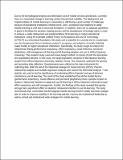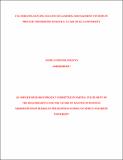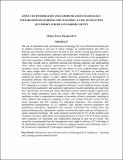| dc.description.abstract | Due to the technological progress and diminution cost of mobile services and devices, currently there is a remarkable change in learning context that demand mobility. The deployment and implementation of mobile learning in universities is still facing a good number of challenges because of educational institutions infrastructure, users` acceptance and readiness to adopt Mobile learning as well due to technical limitations. In addition, there are no adequate guidelines in place to facilitate the decision-making process and the development of strategic plans in order to achieve a viable deployment and implementation of M-learning in higher educational institutions. Using the extended Unified Theory of Acceptance and Use of Technology (UTAUT) as a theoretical foundation, this study sort to establish in a concise and in a systematic way the fundamental factors hindering student’s acceptance and adoption of mobile learning (SaaS model) in higher educational institutions. Specifically, the study sought to analyze the relationship linking performance expectancy, effort expectancy, social influence, perceived playfulness, self-management of learning and M-learning adoption and use in Africa Nazarene University. This research study used and mixed design method. It consist of both the descriptive and quantitative element. In this study, the target population comprise of 609 distance learning student from Africa Nazarene University, Nairobi, Kenya. The researcher used both the primary and secondary data collection. Questionnaires were utilized as the main instruments for collecting data .With the aid of the Statistical Package for Social Services (SPSS), Pearson relationship analysis and multiple regression analysis were used in the inferential analysis. T-test statistic was used to test the significance of moderating effect of gender and age of behavior intentions to use M-learning. The result of the study established that all the studied factors (performance expectancy, social influence and perceived playfulness) have a positive impact on students’ behavioral intention to adopt and use M-learning in Africa Nazarene University except effort expectancy and self-management. Further, the findings of the study revealed that gender and age had a significant effect on students` behavioral intention to use M-learning. The study recommends that, universities should integrate mobile learning (SAAS model) into their strategic plan in order to improve mobility in the learning activity, improve the institutional leadership as well as school and institutional wide strategies for mobile learning. | en_US |




